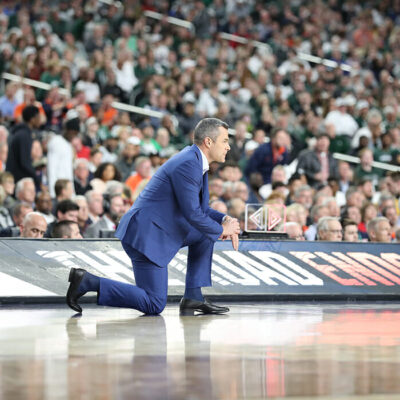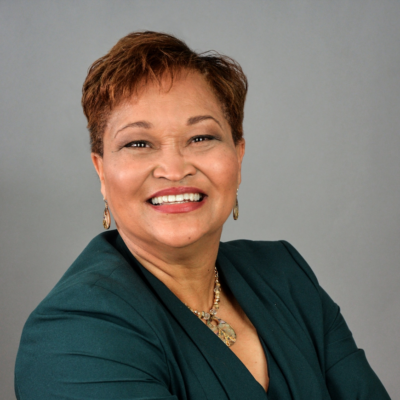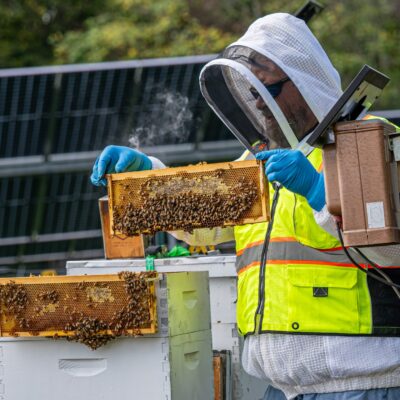Never before have I planned a trip to which people’s reaction universally included the word “crazy.”
Well, this was the one. I was going to Death Valley in July. My father and his friend Kim—my childhood dentist with the tattooed forearms—were planning to run the Badwater Ultramarathon course, a 135-mile race that starts 282′ below sea level and eventually climbs to 8,371′ at Mt. Whitney. In, let it be said, 130-degree heat.
| Destination: Death Valley National Park Location: Southeastern California Distance from Charlottesville: 2,508 miles Death Valley National Park: nps.gov/deva |
Only 83 people qualified for the official 2008 race, and my dad and Kim were not among them. This would be an amateur effort, without the support and structure of the “real” race. Other reasons it was crazy: Although they’d both run ultramarathons before, Badwater—“the most demanding and extreme running race offered anywhere on the planet,” according to the race website—would be their first ultra in years. My dad is 60 and Kim is 59. They live and train in Pennsylvania, which has neither the altitude extremes nor the infernal temperatures of Death Valley. Also, my dad recently took up smoking again. And lost his health insurance.
I was going because I couldn’t imagine not being there (and because ultra runners need support crews to dole out water and fresh shoes), but waves of dread came to me in the weeks leading up to the run. My dad talked about the flawless confidence that he’d need to be successful, and I understood that as a crew member it would be my job to project unwavering optimism. But he also talked about the fact that some runners become irrational—hallucinatory, even—as the run progresses. I figured at some point I might be begging him to stop running. I pictured myself calling his sisters from some little hospital in the desert. I made sure I had their phone numbers with me.
And off we went.
Our wayward little group—two runners and six crew members—flew to Las Vegas and rented three vehicles. We drove through the shimmering, treeless desert to Pahrump, Nevada, and walked into a Wal-Mart for supplies. How much water would we need? Nobody really knew. And what should Dad and Kim eat during a 48-hour run? What should any of us eat? We piled our carts with dried fruit, nuts, peanut butter, canned soup. We bought coolers and ice, sandwiches and coffee and plastic forks, as though headed to a long, strange picnic.
A few hours later, at 5:30, we were standing at the start line in Badwater Basin, which is a place completely devoid of vegetation and covered with salt. When my earrings brushed my neck, I felt little stings of heat. It was well over 120 degrees. Our runners, wearing headcloths to shield their necks, squinted at our cameras, and then suddenly they were running.
In our chilly cars, we crew members drove ahead two miles. I was driving with my dad’s girlfriend, Najat, and when we pulled off the road and put on our blinkers, an uneasy silence descended. Not a tree or building was in sight; once in a long while, a car would pass, its windows tightly sealed. I got out and stood on the road. Then I got back in the car, and sweat covered me immediately. Outside, it had evaporated so fast I hadn’t even known I was sweating.
After a while, my father and Kim appeared in my binoculars, tiny specks of white. I watched them for a minute. They were walking.
When at last they reached us, Kim climbed into his wife’s car and Dad climbed into ours. We exchanged his empty water bottle for a full one. He ate an electrolyte pill and a plum, and I soaked a bandana in ice water for his neck. Soon he and Kim were off again, and again our cars crept forward.
We quickly settled into a pattern: drive, stop, wait. By 7:30 the sun was low, its sloped shafts lighting plumes of dust across the valley, but the heat was hardly letting up. Information moved among the cars: Kim was struggling. He seemed to need longer rests than my dad, who was acting exactly like his usual self—cheerful, attentive, ready to laugh.
Around the 13-mile mark, after dark, Kim’s wife started to worry about running out of gas. We weren’t sure where the next station was. “They were supposed to figure all this stuff out in March,” she complained, referring to a reconnaissance trip Dad and Kim had taken at Easter. “They had a good time, they did some running, they brought home a lot of rocks, but they didn’t do what they were supposed to do.” My back ached and my head ached. But the visions of my dad in trouble were receding.
In the middle of the night, under a wind as steady as a hair dryer, we all slept for nearly an hour in the cars. Najat saw two shooting stars in the immense, sparkling black. Kim was developing blisters on both feet.
He made it well beyond the marathon mark, to 30 miles. Just before he stopped, Najat and I passed him in the car and he said, “Be good! Bye!” The next time we saw him, he and his wife were driving away, toward civilization.
Our group had splintered. Now Najat and I were alone in this vast place, piloting our little island of water and food, draping my dad’s head with wet cloths and watching him recede from us and then grow larger again on the horizon. He still seemed amazingly comfortable; he and I joked and took pictures. A couple of miles before Stovepipe Wells, the first major oasis on the course, I parked the car and walked back to meet him and run with him. “Let’s walk,” he said when we met.
Stovepipe Wells is 42 miles into the course. We’d planned to get breakfast there, and we sat under a sage-green tree outside the restaurant while Dad smoked, thinking out loud. “I was always in this to support Kim,” he said. “Here we are. We could do some sightseeing.” A raven landed on a railing nearby and stood with an open beak.
And so it was over, and we went inside for toast and coffee.





